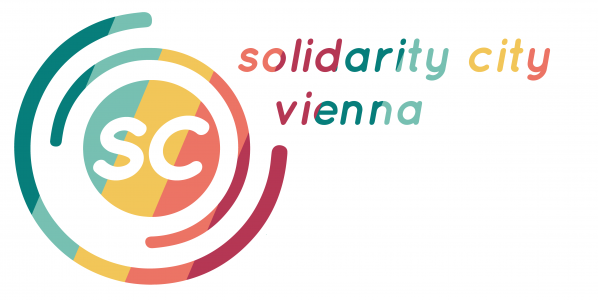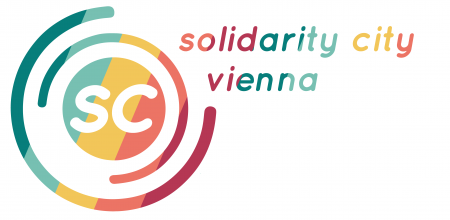Set up by an former asylum seeker and a university student, Der Wiener Deewan is a Vienna’s first Pakistani buffet restaurant based on a pay-as-you-wish concept: guests pay however much they wish. The restaurant is a much loved and always buzzing spot in Vienna.
We stand on a busy street in Vienna’s 9th district. The Votivkirche and the University are not far away. Like a small oasis in the midst of rows of old buildings, a small restaurant stands out with “ALL YOU CAN EAT, PAY AS YOU WISH” written in playful letters on the windows. Canopied benches are set up in front of the entrance area, framed by various plants. The conversations of the guests drown out the noise of passing cars. Der Wiener Deewan has been serving a buffet of Pakistani food for the past 16 years now. Sitting on one of these benches, we meet Natalie Deewan, the co-manager of the restaurant.
The beginnings of Der Wiener Deewan
Natalie Deewan and her partner Afzaal Deewan have been running the restaurant in Vienna for 16 years. Actually, she had never planned to become the manager of a restaurant. When she met Afzaal in Vienna in 2004, she was still studying languages and philosophy and working on her master’s degree in experimental literature. Afzaal had to flee Pakistan and sought asylum in Austria. “When we met, we started to think about his main objective which was: How can I work with my own hands while claiming asylum?”. Setting up a company together with an Austrian partner was the only solution for asylum seekers to work legally in Austria. And thus the concept of the restaurant was born. “When I started the business at a young age, as a student, with no experience in business, together with an asylum seeker, it was very risky. I had spare time, had cheap accommodation and even though I was young, I had savings to invest. I wasn’t bound by big responsibilities. I had the space in my life to take a risk. So I ended up not being involved with experimental literature but an experimental enterprise.” 10 months later, on 30 April 2005, der Wiener Deewan opened.
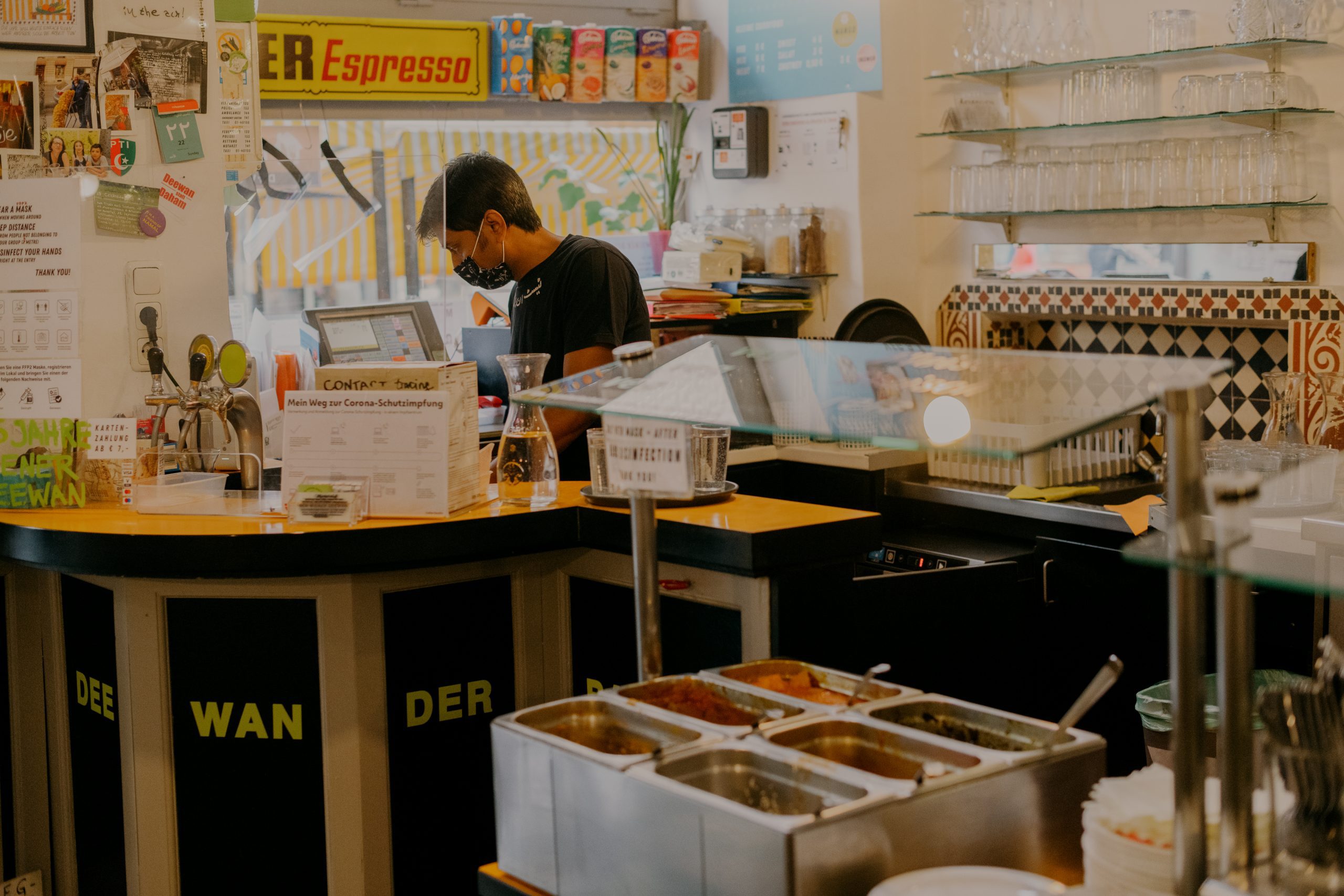
The company of an asylum seeker and a student
Initially, the plan was that Natalie would help with the bureaucratic obstacles. But they quickly realised that asylum seekers don’t have it easy in Austria: “Along the way we found out that you cannot do anything on asylum status, you need an Austrian partner.” That is why Natalie became a full partner in the newly founded company (Kommanditerwerbsgesellschaft, Limited Commercial Partnership). However, the Austrian partner has to assume full liability, the foreign partner only the liability for the assets he takes into the company. The law also stipulates that an asylum seeker may not take a job away from an unemployed Austrian, so Natalie and Afzaal are self-employed. “When we set up the company, business or the issues around migration were completely new to me. My main aim was to bridge two completely different realms, the realm of business and the realm of the asylum sector and make contact between them which would make our purpose possible,” explains Natalie Deewan.
It is therefore not surprising that the topic of migration is important in Deewan’s business philosophy. “It is the DNA of the company. Afzaal has tried to hire people who know Pakistani food. Most of them are from India and Pakistani origin. We have eleven employees, five full-time and six part-time.”
The philosophy behind Der Wiener Deewan and its open price policy
When you go to Der Wiener Deewan, you have a choice of various Pakistani dishes. You can get as many refills as you want, and in the end, you pay as much as you want. Drinks have fixed prices, water is served automatically and free of charge. However, the beginning of Deewan’s was not to implement a specific philosophy, it was more pragmatic, as they wanted to find a way for Afzaal to be employed, Natalie explains: “Solving the problem was the beginning. It wasn’t about implementing a philosophy. There was a given problem that we had to find a solution for.”
The different cultural backgrounds of the founders also played into the pricing philosophy. Bargaining is more a part of daily life in Pakistani culture than in Europe. Afzaal wanted an all-you-can-eat buffet and Natalie wanted a pricing model where you pay as you wish. “We thought people could give as much as they liked the food. We just tried it out. You need someone to trust a new idea, and we both felt it would work.” And the idea worked. The opening of the restaurant generated a lot of positive press. People came because they were interested in the food, but also because they found the pay-as-you-wish concept exciting.
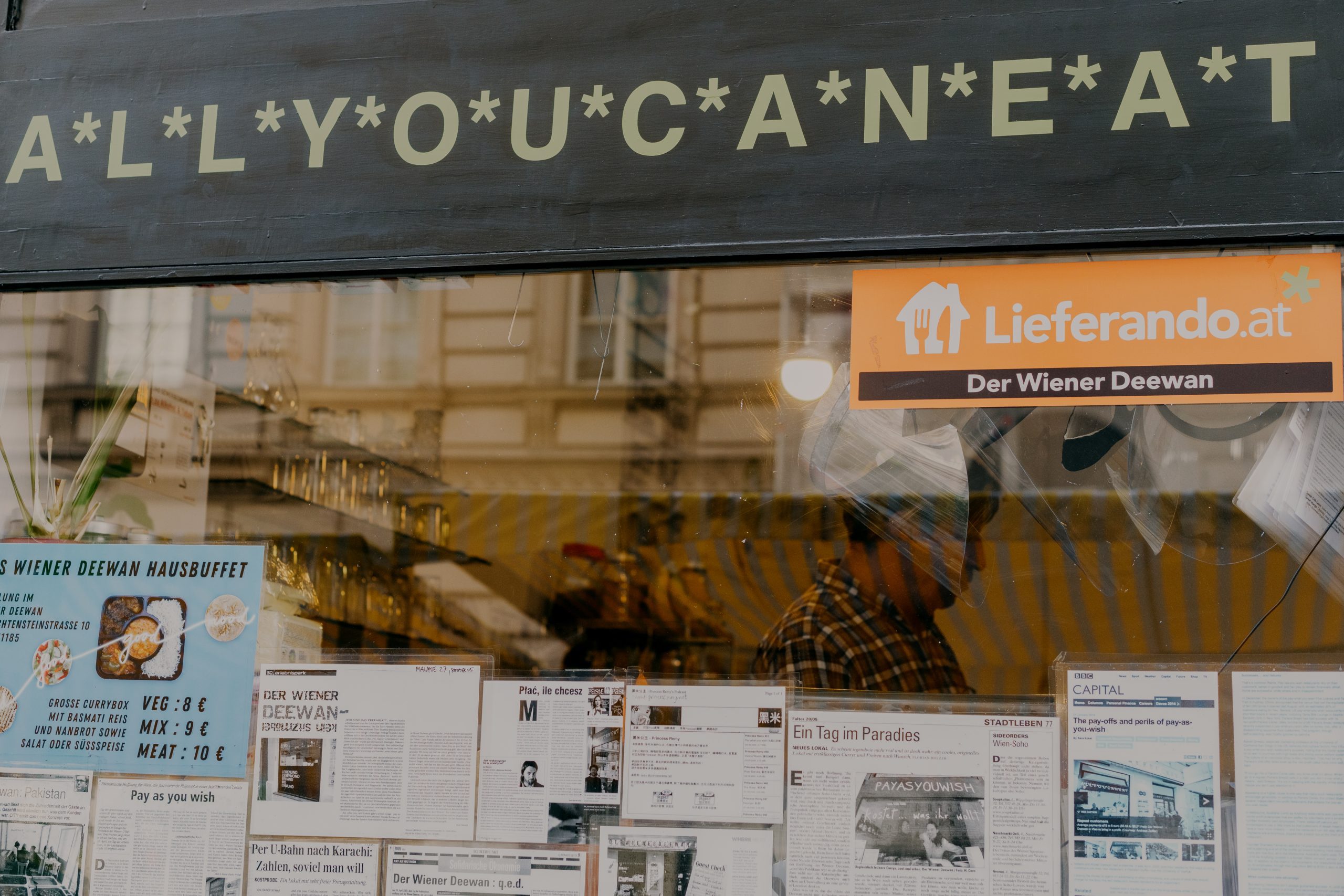
A balancing act
As exciting the pay-as-you-wish concept is, it also comes with a lot of trust: “It is like a physics experiment. If one gives less, the other has to give more to balance it out. It is a balancing enterprise.” The low threshold pricing policy can go both directions. There are people who take advantage of the system, but there is also a lot of generosity to balance it out. “About two weeks ago a young man who was here for the first time, gave 50 euros. This does not happen every day. It was a show of respect and support”, recounts Natalie. But why don’t most guests take advantage of the system? “I would call it egocentric thinking in its positive sense. From the guests’ points of view, if they want to have this place tomorrow and the day after tomorrow then they have to contribute to it. It is about mid-term and long-term thinking. If you are short-sighted and use it for short term benefits, you will not have it around next year.” The pricing plan is so much part of the restaurant, it would be difficult to be without it. But it comes also with some drawbacks. For example, the use of free-range chicken would be too expensive for the current pricing model.
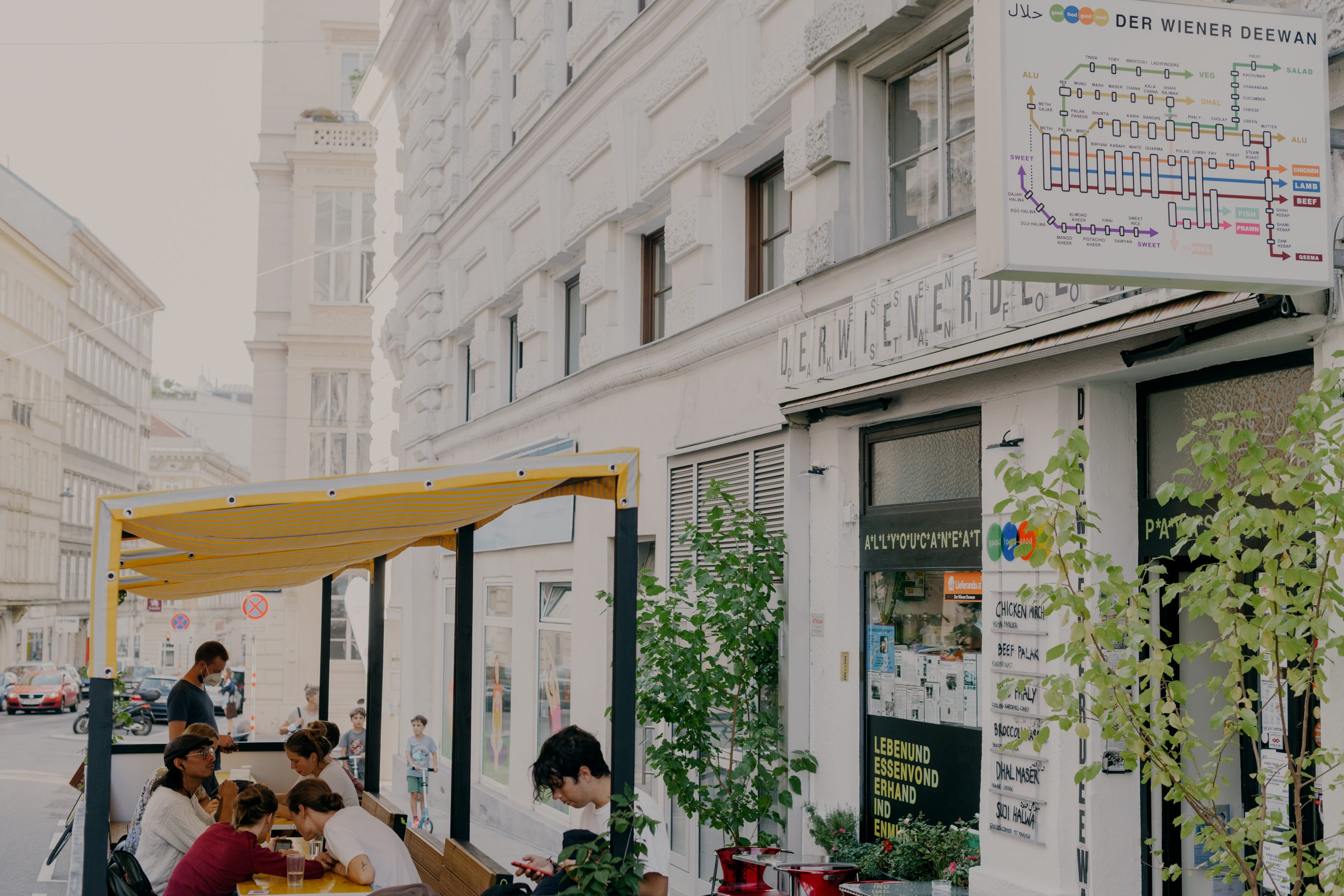
Nevertheless, Der Wiener Deewan did make adaptions over the years. For instance, after several requests by vegan guests, the originally vegetarian dishes are now vegan. Deewan also serves halal food, which is important to another group of people. People eating halal and vegan do not normally intersect so the restaurant is important for different people. “This is a place where due to the low-threshold price policy people of different backgrounds meet. We have an autonomous culture, an alternative atmosphere.”
The challenges faced these days
The Covid-19 pandemic is also a challenge for Der Wiener Deewan. “When we were in lockdown there was one sentence in my head: “Solidarity is not a one-way street.” Corona Kurzarbeit (In Austria the government introduced a short-term working scheme during the pandemic which provided at least 80% of pay for employees) is a traumatic word for me. In solidarity, the employer keeps paying for all the employees, but the refund from the state for the companies came very late, regularly half a year later, once even more than a year later. All that while being closed for over 6 months.” But because Natalie and Afzaal are self-employed they could not benefit of the Kurzarbeit themselves. “In solidarity, the employer keeps paying for all the employees. Self-employed people take a lot of risks, but where is the solidarity from the side of the state?”
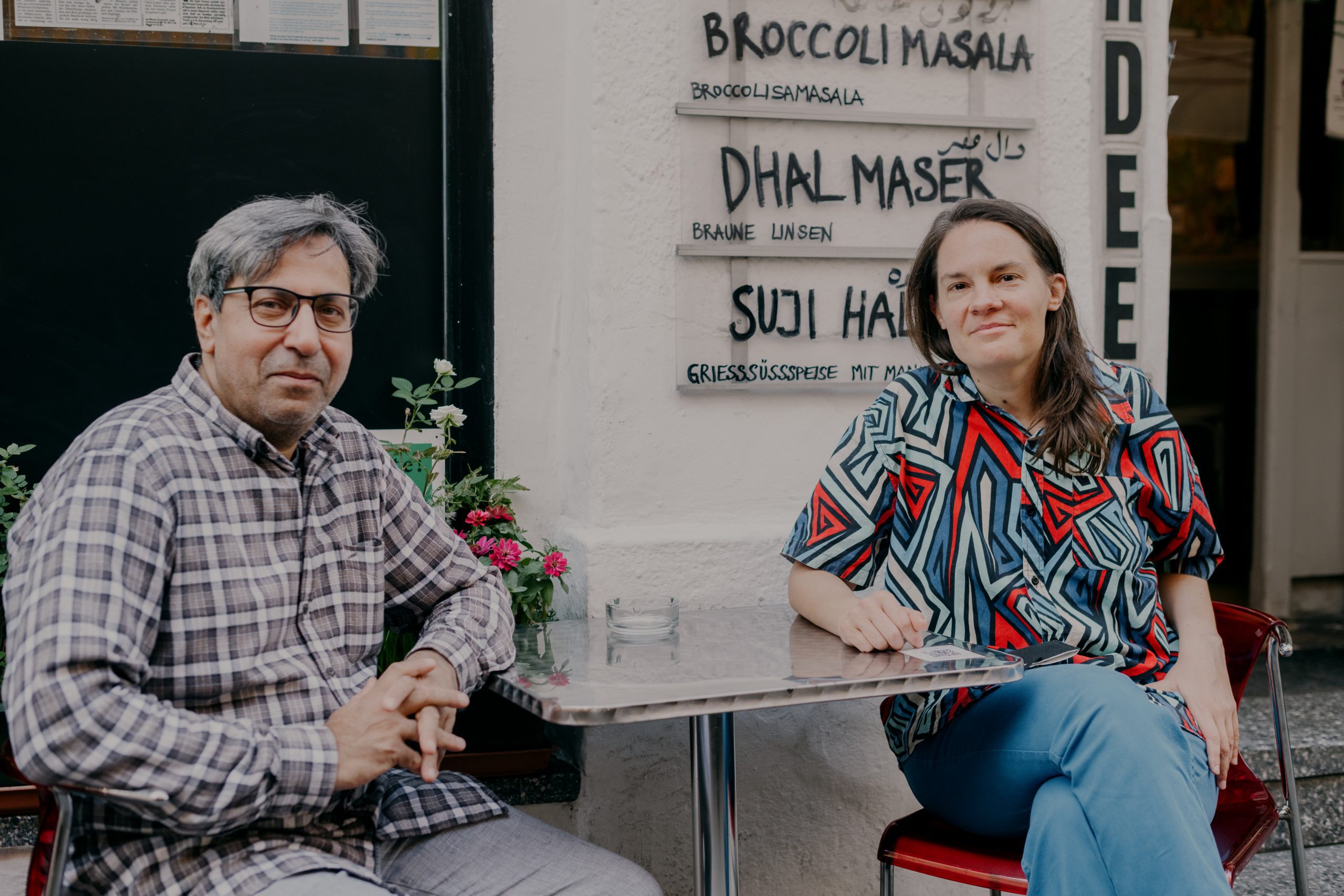
Deewan’s wish for the future
Long-term thinking and taking responsibility are two key aspects that Natalie Deewan would like to see more of from society in the future. “We have seen in the pandemic that it is so difficult for some people to do their share to end the pandemic. We tried a lot from our side. I asked the health bureau to send leaflets that we could hand out as information about vaccination, as we are a platform where many people come every day, they might trust us. This is solidarity too. What I have seen too often is the attitude of “it is not our responsibility”. With this attitude we won’t be able to face big challenges. I am also wishing for people to be more risk-taking. People who are self-employed do that. Those are the people who really take initiative and risks. Do you want to avoid mistakes at all costs or grow from your mistakes?”
You can visit Der Wiener Deewan and enjoy their great food: Liechtensteinstraße 10, 1090 Wien
Interview by David Schermann.
